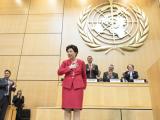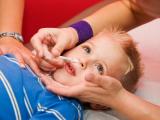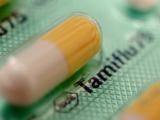Nov 2, 2009 (CIDRAP News) – Interim clinical trial findings announced today affirm that children younger than 10 need two pandemic H1N1 vaccine doses, and initial findings in pregnant women reveal no safety concerns and a need for only one dose.
Federal officials also detailed the role of an independent panel of experts to review vaccine safety data and released a report outlining the government's vaccine safety monitoring system.
At a media briefing today, Bruce Gellin, MD, director of the National Vaccine Program at the US Department of Health and Human Services (HHS), said federal officials realize that, despite problems with vaccine supply and demand, Americans still have concerns about its safety. He told reporters that an independent expert group charged with reviewing vaccine safety data met for the first time today to become familiar with the data sources they'll be reviewing.
In addition, a federal task force today released a 20-page report that outlines beefed-up systems that officials have put in place to monitor the safety of the vaccine. US health officials are mindful of the 1976 swine flu vaccination campaign, which reached more than 40 million people but was associated with an increase in cases of Guillian-Barre syndrome, a temporary paralytic condition.
Though vaccine safety and purifications steps are much more advanced today, officials have added new systems to track the pandemic H1N1 vaccine and are taking extra steps to add transparency to the process, in hopes of reassuring the public.
Anne Schuchat, MD, director of the CDC's National Center for Immunization and Respiratory Diseases, told reporters that a cumulative total of 30 million doses of pandemic H1N1 vaccine have been produced for states to order, which represents an increase of 3.4 million since Friday.
Vaccine data for children
The latest findings of vaccine efficacy in children come on the heels of a recommendation from World Health Organization (WHO) vaccine experts who on Oct 30 recommended that most people, even young children, receive just one dose of the vaccine.
Though the group acknowledged they didn't have much data to base their guidance on, they said countries that have placed children as a high-priority group to receive the vaccine should administer one dose so they can immunize as many children as possible.
Anthony Fauci, MD, director of the National Institute of Allergy and Infectious Diseases, said the findings today, from National Institutes of Health (NIH) studies, are critical to public health officials who are charged with making policy decisions and to the public for making personal decisions for themselves and their loved ones.
He said interim results on vaccine in healthy children ages 6 months to 17 years confirm early results reported on Sep 21. The new findings show that children younger than 10 who receive a second 15-microgram (mcg) dose of pandemic H1N1 vaccine have significant immune response improvement.
The new data were obtained 8 to 10 days after the second vaccine dose, compared with the first findings, which were obtained 21 days after the first dose.
In the youngest children (6 to 35 months), 100% had a robust immune response after the second dose compared with only 25% after the first dose. In those ages 3 through 9, 94% had a robust immune response after the second dose, compared with 55% after the first dose.
Immune responses were comparable in those receiving two 15-mcg doses and in those who got two 30-mcg doses, suggesting that the smaller dose is enough to elicit a strong immune response, according to an NIH press release today.
"Our guidelines seem to fit quite nicely with the science," Fauci said at the news conference. "We would like to get children as fully protected as we can."
Efficacy in pregnant women
In the initial results on the vaccine in pregnant women, immune response to the pandemic H1N1 shot was similar to that seen in healthy adults.
Public health officials have placed pregnant women at the front of the line to receive the vaccine because they have been disproportionately hit by the virus. So far the CDC has received reports of at least 100 pandemic flu infections in pregnant women that required intensive care unit (ICU) treatment, as well as reports of 28 deaths.
In a subgroup of 50 pregnant women participating in an NIH clinical trial, a preliminary analysis of blood drawn 21 days after vaccination showed the vaccine was likely protective in 23 of 25 women (92%) who received a single 15-mcg dose and that it was likely protective in 24 of 25 (96%) who received a single 30-mcg dose.
The trial began on Sep 9, according to an NIH press release. Participants were between ages 18 and 39 and were in their second or third trimester when they began the study. The ongoing study will also assess the effects of a second dose. Investigators are using Sanofi's pandemic H1N1 vaccine, which does not contain the preservative thimerosal or an immune-response-boosting adjuvant.
Despite the heightened threat of the virus to pregnant women, public health officials worry about the uptake of the pandemic vaccine in this group, because only about 15% of pregnant women typically receive the seasonal vaccine. Safety monitoring of the drug conducted by researchers and an independent expert panel so far suggests that the vaccine is well tolerated, with no safety concerns so far.
"For pregnant women, who are among the most vulnerable to serious health problems from 2009 H1N1 infection, these initial results are very reassuring," Fauci said.
Vaccine-safety group
Gellin said the independent vaccine safety expert group that met today in its first face-to-face meeting will meet biweekly to review the latest data and will report its findings each month in a publicly accessible conference call with the HHS's National Vaccine Advisory Committee.
The vaccine safety group will be receiving regular briefings from the NIH and the Biomedical Advanced Research and Development Agency (BARDA) and can convene rapidly if needed.
See also:
Nov 2 NIH press release on vaccine response in children
Nov 2 NIH press release on vaccine response in pregnant women
Federal Immunization Task Force report on plans for monitoring pandemic H1N1 vaccine safety
Sep 21 CIDRAP News story "Trial predicts 2 H1N1 shots for young kids, 1 for older"



















